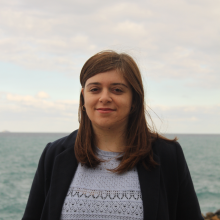

Phanee Manganas is a post-doctoral researcher at IESL-FORTH. She received her BSc in Biology (Specialisation in Biomolecular Sciences and Biotechnology) and MSc in Molecular Biology and Biomedicine from the University of Crete. She then continued her studies at the University of Glasgow (UK), from where she obtained a PhD in Biochemistry and Molecular Biology, while working on oxidative regulation mechanisms in the mitochondrial intermembrane space. Since joining the team of the Ultrafast Laser Micro- and Nano-Processing (ULMNP) group, she has been interested in interpreting the effect of 3D architecture on various cellular processes – including growth, survival, adhesion and differentiation – from a molecular and biochemical viewpoint, in order to understand the ways in which cells interact with the fabricated environment.
Education
- 2017 – PhD in Biochemistry and Molecular Biology, Institute of Molecular, Cell and Systems Biology, University of Glasgow, Glasgow, United Kingdom
- 2013 – MSc in Molecular Biology and Biomedicine, University of Crete, Heraklion-Crete, Greece
- 2011 – BSc in Biology (Specialisation in Biomolecular Sciences and Biotechnology), University of Crete, Heraklion-Crete, Greece
Career
- 09/2018 – Today – Post-doctoral research assistant, Ultrafast Laser Micro- and Nano-Processing (ULMNP) Group, IESL-FORTH, Heraklion-Crete, Greece
Interests
- Biocompatibility assessment of micro- and nano-patterned surfaces
- Molecular and biochemical characterisation of cellular responses on micro- and nano-patterned surfaces
Awards/Prizes/Distinctions
- 2011-2012 – M.Sc. Studentship from the Institute of Molecular Biology and Biotechnology, Foundation for Research and Technology – Hellas (IMBB-FORTH), Heraklion-Crete, GR
- 2010 – Scholarship from the Greek State Scholarships Foundation (IKY) for the academic year 2008-2009